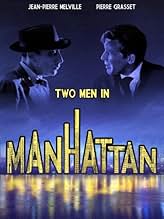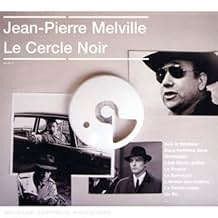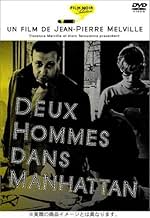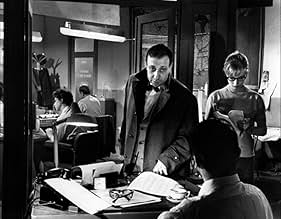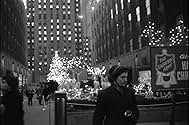Añade un argumento en tu idiomaA French UN delegate has disappeared into thin air, sending reporter Moreau and hard drinking photographer Delmas on an assignment to find him. Their only lead is a picture of three women.A French UN delegate has disappeared into thin air, sending reporter Moreau and hard drinking photographer Delmas on an assignment to find him. Their only lead is a picture of three women.A French UN delegate has disappeared into thin air, sending reporter Moreau and hard drinking photographer Delmas on an assignment to find him. Their only lead is a picture of three women.
- Dirección
- Guión
- Reparto principal
- Bessie Reed
- (as Michele Bailly)
Reseñas destacadas
Eventually they locate the man and then comes an important decision- -what to do with this information. The photographer, naturally, wants to make the most of it and spread sensationalistic photos everywhere. The other guy is decent and tries to get his new partner to do the right thing.
I love the films of Jean-Pierre Melville--at least up until this one. It's not a terrible film but nothing like the great film noir features Melville made (mostly in the 60s and 70s). But it did have a homemade feel--cheap and definitely more French New Wave than his usual more polished work. Lots of cheap stock footage of New York was used and so many of the English-speaking actors sounded anything but like New Yorkers. French audiences probably wouldn't have recognized this, but to an American the accents often don't fit or sometimes sound like foreigners TRYING to sound American...and failing. Mildly interesting and clearly the last portion is by far the most interesting. Plus, being a French film it has some nudity, lesbianism and other plot elements you just wouldn't have found in an American film of the time.
Jean-Pierre Melville filmed both a Noir love letter and, almost a time capsule video documentary of 1958 New York City. From the opening bars of the jazzy score and Googie style credits that run over a wonderful (looking out the back window of a cab) trip down through traffic, a traffic of tail fin adorned cars, traveling South along Broadway, and then on 7th Avenue right through the heart of manically lit Times Square you know you are in for a special visual treat.
Melville's New York is the real deal. Its not some Hollywood back lot dressed up like New York City. Melville's New York is a dreary smoggy winter sky New York. The old New York that belched black coal smoke by the ton into the atmo, a New York of steaming manholes in streets that were choked with Buses and Checker Cabs. Melville's New York was a Holiday Day New York festooned with Christmas decorations two days before December 25th.
Two journalists become de facto detectives tracking down a missing diplomat through the underside of New York.
Pierre Grasset is great as the smart-alek Delmas his picaresque portrayal is very effective playing against Melville who is relatively somber. The film has but few flaws, probably the most notable for me are the interior shots of the E.D.D.I.E. whorehouse, the actresses playing the hookers seem to be speaking English phonetically, and ditto for the stripper Bessie Reed or she may just be dubbed. The excellent soundtrack is by Christian Chevallier and Martial Solal. 8/10
Two Men In Manhattan is available on DVD from Cohen Films it's in French with English subtitles.
If you are looking for a noir with verve and great music, why not try Ascenseur pour l'echafaud, with REAL actors and Miles Davis's great score.
'Deux Hommes' is generally considered one of Melville's least successful films, and the director rejects it in his famous interviews with Rui Nogeuira, claiming that its failure made him seriously rethink his way of making films. It's not easy to see why it should be so disapproved of. The narrative is brisk if conventional, as it follows a traditional detective story route of problem, investigation, solution. Perhaps what is most objectionable is the film's theme, the idea that sometimes it is honourable and proper to conceal the truth from the public.
I may be biased - this was my first Melville film, eight years ago, beginning a love affair that is even more intense today - but I think 'Deux Hommes' is pretty good, for a number of reasons. Most immediate is Melville's use of light and darkness, the way he works between blazing neon and dense obscurity, as he does between noise and silence or sharp montage and Wyler-like deep-focused long-takes. This visualises the theme of the film, the darkness of the 'victim''s absence brought to light by the investigative journalists, with truth thrown back into the darkness.
Although Melville's heroes seem less 'deconstructed' here than in his most famous films, he uses subtly elaborate means to undermine them. Throughout, they are in a position of power, moving with ease through the different worlds of New York, from burlesque houses and brothels to expensive bourgeois apartments, linking two seemingly disparate realms. When interviewing people who knew Fevre-Berthier, Moreau remains rigidly framed, while his interlocutors are shot from different angles, cut up, fragmented, figuring his unbreakable integrity, and their dissimulating multiple identities.
But Moreau, for all his supposed decency, is never as powerful as he thinks. His firm point of view is often broken up by unmotivated angles that problematise scenes he dominates. He is frequently swallowed up in darkness, his authority literally disappearing. God-like camera angles looking down on him mirror the car that follows him - unlike a conventional detective, he has less information than we do, and so is emasculated. His body is sometimes broken up by Melville's compositions, particularly when the pair come out of Capitol Studios, and are shot from inside a car, watched by an unseen stranger, or in the climactic chase, as he keeps getting out and back into the car, his head repeatedly lopped off.
this undermining is linked to the theatrical metaphors strewn throughout. The four women interviewed are all linked to performance - an actress, a singer, a call-girl pretending to be Marilyn Monroe, and a stripper. Dalmas mimics Fevre-Berthier, and invents a different death for the victim, just as Moreau and his boss finally do. The men play the role of brother and friend to sneak into the hospital. They repeatedly enact what they're going to do or see. Throughout the film we get shots of the surface of New York, as if nothing has changed, but once we have penetrated the world beneath the glitter, it is impossible to take these signs, or these men, in the same way again.
Unusually for a Melville 'crime' film, the protagonists are detectives and not gangsters. However, Melville uses similar tropes to his gangster films to further undermine his heroes. The hospital scene is familiar from these films, the shaking up of someone with information, Moreau waiting outside like a boss, while his henchman does the dirty work. Moreau, throughout the sequence, with his 'gentle' persuasiveness, becomes genuinely sinister.
As they wait with the corpse in his lover's apartment, Moreau and Dalmas are visited by the editor, the 'Boss', wearing shades - his dealing with the body, his wearing shades indoors, his re-arrangement of the truth are all gangster staples, and yet he is the editor of a reputable magazine, determined to bury the truth about a Churchill-praised Resistance hero.
Melville is often acclaimed/reviled as France's greatest Americophile. It is here significant that Melville the director is also the lead actor, because just as the actor goes through a real geographical space, the director goes through an imagined cultural space of favoured American landmarks, Time Square, Broadway, Mercury Theatre, Time Magazine, Capitol Studios etc. The anti-hero's name is Delmas, a reference perhaps to John Dalmas, Chandler's prototype Philip Marlowe.
This kind of allusionism further destabilises the film's realism, as do narratively irrelevant shots of cigarette packets, the brand smoked by Melville's one-time friend Godard. Melville is always pushing back the limits of his genre, the hilarious, 'A Bout de Souffle'-like jazz-warnings to remind us of the car following our heroes, the car-lights seem to wink at us, as if we're both in on the joke on the heroes. In a very striking scene, flagrantly breaking 'plausibility', Moreau gets into the driver's seat with the address card of their next destination. The soundtrack suggests they start up and drive off, but the camera stays in an immovable car on the driver holding the card. In the penultimate scene, as Delmas lays slumped on the floor, the band that had been the act become the audience; a trumpeter approaches and blows with mock-melancholy.
There is so much more in this deceptive, short film that deserves a reconsideration, especially for its incredibly detailed technique that never forces itself, but is very rich. But the film works best for me as a (Hustonian?) study in failure, of the film's other hapless womaniser, Delmas, a great talent doused in impotence and drink, prepared to do vicious things for a break, a man who could have had everything, but seems shell-shocked by life, who can only find beatitude through alcohol. Rather him than the deeply creepy probity of his partner.
Said to be a combination of American film noir and the budding French New Wave movement, Two Men in Manhattan very neatly utilizes the good sides of both styles. The urban street views and skyscrapers look excellent in the glow of the bright ad signs on store marquees and the dark, stark lighting set up for interior scenes is a joy to the eye too. The laid-back jazz soundtrack is highly enjoyable, creating a mood softer than in hard boiled detective noirs, even though the seedy locations would fit in such flicks seamlessly as well.
A lot of the film's charm lies on the shoulders of the two protagonists, who suit their roles splendidly. Melville's sad-looking appearance matches his character's melancholic but righteous attitude perfectly, while Grasset makes a great pairing for him as the greedy and amoral Delmas, prone to drinking and sleeping around. Ultimately their opposing approaches to the ethics of journalism are what create one of the main themes of the film; namely, examining the responsibility of the press when publishing stories of delicate nature. Besides the lead duo, the supporting actors do a good job too, from a suicidal stage actress Judith Nelson (Ginger Hall) to a jaded cabaret dancer Bessie Reed (Michèlle Bailly) and a jazz singer Virginia Graham (Glenda Leigh) who we get to see recording a haunting song in a studio.
All in all, when a film successfully combines a totally smooth and cool atmosphere with suspense and humour like Two Men in Manhattan does, it just cannot be anything but highly enjoyable. The movie is simply thoroughly entertaining, but since the technical elements are also very skilfully created, there is no reason to skip this one if you're even remotely interested in film noir and French cinema.
¿Sabías que...?
- CuriosidadesThe first credited acting part for director Jean-Pierre Melville.
- Citas
The Singer: [sings] There's a street in Manhattan / With a house that has no windowpanes / And the lamp that burned all night / Listen man, go away from me / I lived there so long ago / With a guy you wouldn't care to know / God it's cold here / Nothing good here / Go man / Not tonight
- ConexionesFeatured in Keeping Up Appearances (2013)
Selecciones populares
- How long is Two Men in Manhattan?Con tecnología de Alexa
Detalles
- Fecha de lanzamiento
- País de origen
- Idiomas
- Títulos en diferentes países
- Dos homes a Manhattan
- Localizaciones del rodaje
- Nueva York, Nueva York, Estados Unidos(Exterior)
- Empresas productoras
- Ver más compañías en los créditos en IMDbPro
Taquilla
- Recaudación en todo el mundo
- 2527 US$
- Duración1 hora 24 minutos
- Color
- Mezcla de sonido
- Relación de aspecto
- 1.37 : 1
Contribuir a esta página



